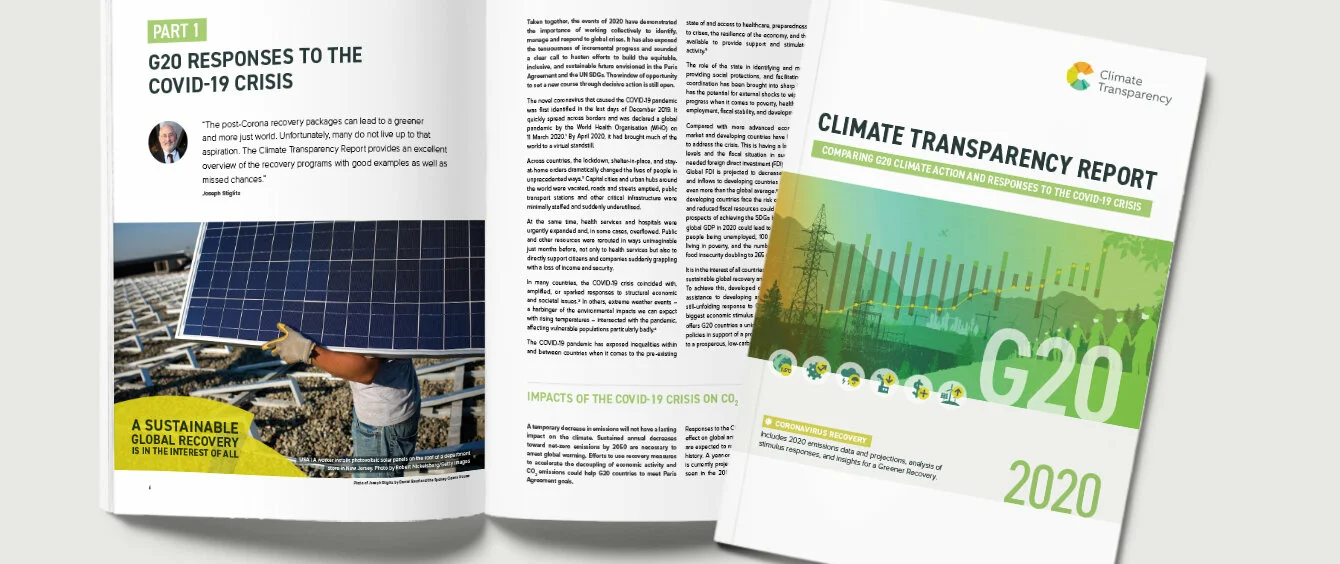The world’s top twenty industrialised and emerging countries have reached a turnaround in the battle against climate change. In 2019, energy-related carbon dioxide emissions dropped by 0.1 percent – a debut in modern reckoning following a steady rise. But is this trend enough to achieve the Paris climate goals?
Climate Transparency submitted a report including a status update on progress in climate protection made by the world’s strongest economies at the G20 Summit at the end of November 2020. The study by a consortium of scientists and civic organisations from ten G20 nations also explores whether the aid programmes adopted to counter the COVID-19 pandemic have the potential to spur the energy transition – producing lacklustre findings.
But let’s start with the good news. Thanks to targeted political measures in all G20 member states, the average share of the electricity mix accounted for by renewables in 2019 was 27 percent. This represents a 20 percent increase since 2014, with figures trending upward on the strength of forecasts, which have capacity expanding by an average of 1.1 percent across all countries. The biggest gain, of 5.1 percent, has been predicted for the United Kingdom.
Renewables accounted for 27% of power generation in the G20 in 2019
Source: Enerdata, 2020Projected percentage point change in share of renewables in power generation (2019 to 2020)
Source: Enerdata, 2020Numerous countries lack specific plans
By contrast, the initiative’s assessment of the measures’ suitability for achieving the Paris two degree goal is more sobering. Only India’s plans to reduce emissions by 33 to 35 percent relative to 2005 were found to be sufficient. In fact, five nations, including Russia and the USA, are pursuing a “critically deficient” strategy. The EU target is classified as “insufficient”. According to the report, the problem lies in many countries still lacking a detailed concept dedicated to reducing greenhouse gas emissions in key sectors such as transportation and industry. This is compounded by the shrinkage in the tree count observed in many regions, causing less carbon dioxide to be withdrawn from the atmosphere.
The authors recommend immediate strategies to combat the climate crisis, calling for an accelerated phaseout of fossil fuel subsidies and the decarbonisation of transport. So far, only France, Canada, Japan and the United Kingdom have introduced regulations that are compatible with the 1.5 degree target. Another plea is for more energy efficient industry, with Germany’s hydrogen strategy being cited as a positive example.
Making aid conditional
Another conclusion drawn by the study is that the G20 member states must refine the aid packages introduced to mitigate the effects of the coronavirus pandemic. Although emissions dropped considerably in 2020, this is far from ushering in a new trend. After all, the aid could jump start the economy, but drive up greenhouse gas emissions as well: 30 percent of the funds go to sectors that are very detrimental to the environment, ten countries support the coal industry, nine promote the oil sector, and 14 are bailing out airlines without making the aid subject to climate protection measures. On a positive note, all nations except Mexico, Russia and Saudi Arabia intend to subsidise sustainable industries as well as the expansion of renewable energy. The study credits the Next Generation EU programme with making the strongest contribution to protecting the environment and climate. To safeguard and create jobs as well as promote long-term economic growth, the report further recommends that governments invest in sustainable infrastructure. It calls for forestation and greener agriculture programmes along with investment in research and development to be included in reconstruction schemes.
Moreover, the study deems it indispensable to subject subsidies to the fulfilment of requirements while creating incentives and tax rebates for renewable energy usage. Only then, it finds, can this “unique opportunity to accelerate transitions” be seized effectively.
Photo credit: © Climate Transparency
